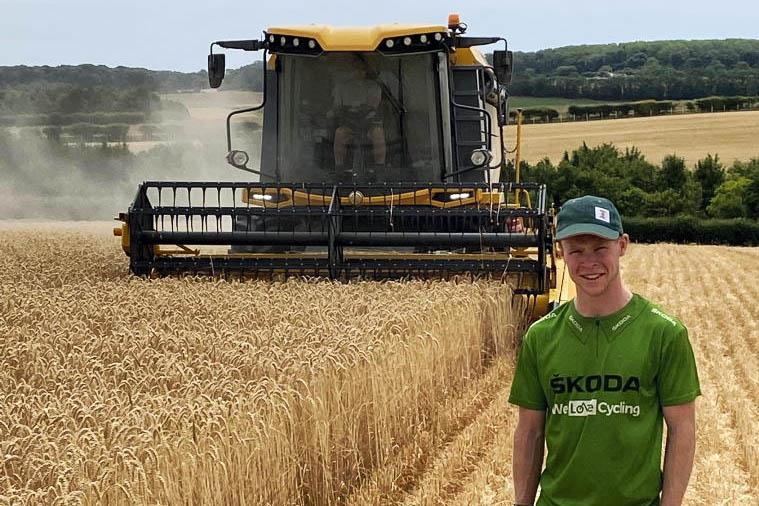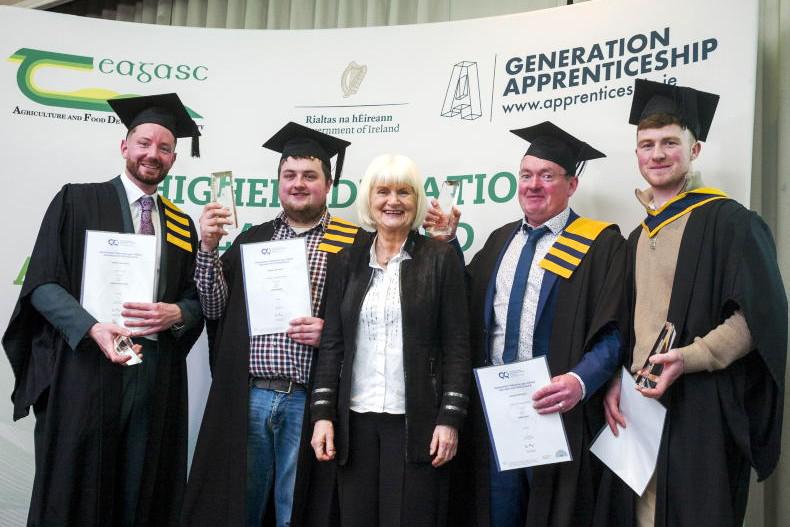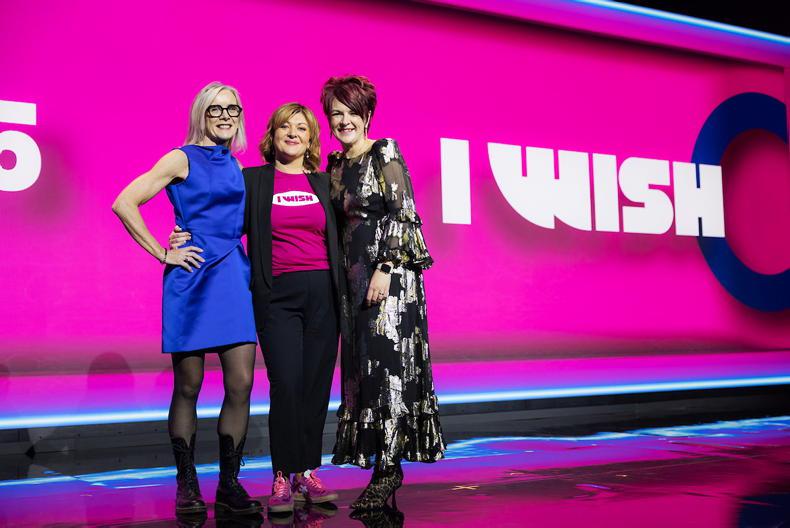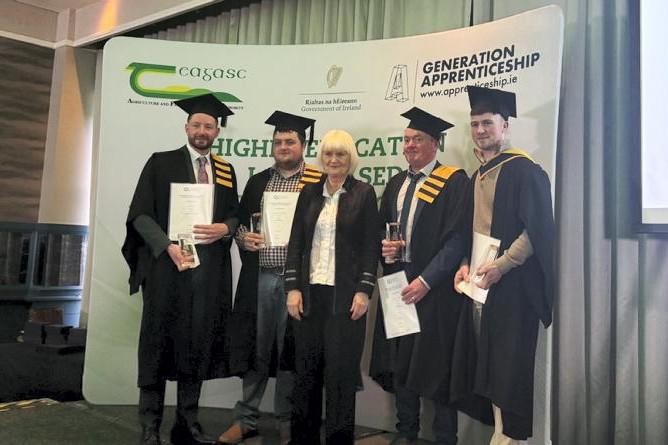Jack Moran from Co Westmeath undertook two different placements: the first was a 950-herd in Germany and the second was with KWS, a seed breeding company in the UK.
My professional work experience abroad started at the Grasmilch dairy farm in Brandenburg, Germany. This is owned by the Costello brothers, Paul and Steven, from Galway. Most of the employees on the farm are Irish and this made settling into the lifestyle easier. It is a 950-cow herd grass-based system where cows remain outdoors all year round.
“The grass-based system that is common in Ireland is quite rare in Germany, as most dairy operations in Germany are indoors. In 2016, the Costellos installed a 60-head Waikito rotary parlour. Being there in April and May, I got to experience the end of calving and the beginning of breeding on the farm. It was great to see the changeover from their outdoor sand pads where I fed the cows round silage bales each morning, to the cows being put on to grass in May.
“Grass supply is a big challenge here due to the dry spring and sandy soils. There is very little spring growth, but the summer months compensate for this deficiency.
“The farm will always experience a drought and this year they are considering zero-grazing land further away from the grazing platform and bringing it to the cows. Having a Jersey-cross herd allowed them to leave cows out during the harsh German winter on the sandy soils and still get good milk yields. The Costellos always emphasised the importance of the cows being self-sustainable, meaning they could get good milk yields off a grass-based diet [be it preserved or in a pasture].
Improving genetics in crops
“I then moved on to work at a seed breeding company called KWS UK, which is based in Cambridgeshire. Here, I saw how the best genetic traits are selected and crossed until a superior variety is created. This process starts with crossing purebred male and female plants in the glasshouse, then selecting the best varieties in the field and trialling them in bigger plots until they have a variety for the national list.

Jack Moran with fellow UCD student Geoff Power on placement in Germany.
“I worked on multiplying the seed varieties which had made it to the national list.
“This involved blowing down the combine three times after each variety had been harvested to ensure that there is genetic purity.
“In KWS, I got the unique opportunity to see the research into hybridising wheat, which, if successful, could result in sizeable increases in yield, as we have seen already in maize, rye and barley. I found it great to see the breeding and research side of the company along with the more practical trials side where we can witness the results of better breeding in the crop.
“The UK experienced its hottest and driest summer, which put greater stress on the crops and led to field fires in some areas around Cambridgeshire.
“With rising fertiliser prices and a need to feed a growing population, improved genetics in the crop is the solution to a lot of these problems.
“Completing my professional
work experience abroad opened my eyes to new ideas within agriculture and gave me experiences that I won’t forget.”
Read more
ASA Student placement bursary series: Ciara Leonard, Sheep farm, Co Tipperary.
The ABP Angus Youth Challenge in Northern Ireland
Jack Moran from Co Westmeath undertook two different placements: the first was a 950-herd in Germany and the second was with KWS, a seed breeding company in the UK.
My professional work experience abroad started at the Grasmilch dairy farm in Brandenburg, Germany. This is owned by the Costello brothers, Paul and Steven, from Galway. Most of the employees on the farm are Irish and this made settling into the lifestyle easier. It is a 950-cow herd grass-based system where cows remain outdoors all year round.
“The grass-based system that is common in Ireland is quite rare in Germany, as most dairy operations in Germany are indoors. In 2016, the Costellos installed a 60-head Waikito rotary parlour. Being there in April and May, I got to experience the end of calving and the beginning of breeding on the farm. It was great to see the changeover from their outdoor sand pads where I fed the cows round silage bales each morning, to the cows being put on to grass in May.
“Grass supply is a big challenge here due to the dry spring and sandy soils. There is very little spring growth, but the summer months compensate for this deficiency.
“The farm will always experience a drought and this year they are considering zero-grazing land further away from the grazing platform and bringing it to the cows. Having a Jersey-cross herd allowed them to leave cows out during the harsh German winter on the sandy soils and still get good milk yields. The Costellos always emphasised the importance of the cows being self-sustainable, meaning they could get good milk yields off a grass-based diet [be it preserved or in a pasture].
Improving genetics in crops
“I then moved on to work at a seed breeding company called KWS UK, which is based in Cambridgeshire. Here, I saw how the best genetic traits are selected and crossed until a superior variety is created. This process starts with crossing purebred male and female plants in the glasshouse, then selecting the best varieties in the field and trialling them in bigger plots until they have a variety for the national list.

Jack Moran with fellow UCD student Geoff Power on placement in Germany.
“I worked on multiplying the seed varieties which had made it to the national list.
“This involved blowing down the combine three times after each variety had been harvested to ensure that there is genetic purity.
“In KWS, I got the unique opportunity to see the research into hybridising wheat, which, if successful, could result in sizeable increases in yield, as we have seen already in maize, rye and barley. I found it great to see the breeding and research side of the company along with the more practical trials side where we can witness the results of better breeding in the crop.
“The UK experienced its hottest and driest summer, which put greater stress on the crops and led to field fires in some areas around Cambridgeshire.
“With rising fertiliser prices and a need to feed a growing population, improved genetics in the crop is the solution to a lot of these problems.
“Completing my professional
work experience abroad opened my eyes to new ideas within agriculture and gave me experiences that I won’t forget.”
Read more
ASA Student placement bursary series: Ciara Leonard, Sheep farm, Co Tipperary.
The ABP Angus Youth Challenge in Northern Ireland










SHARING OPTIONS